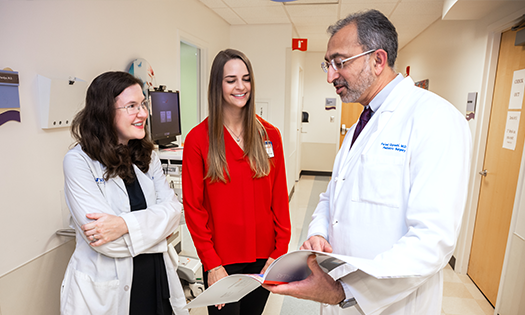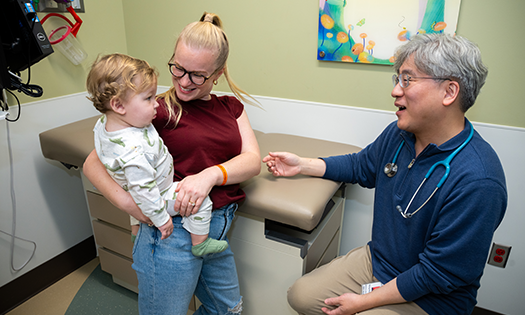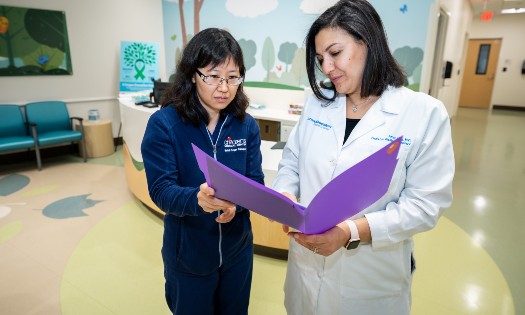Since launching our solid organ transplant program in 1984, Children’s Health℠ has performed more than 550 liver transplants – and our liver transplant program is one of just three in the nation with a 100% survival rate at 30 days, one year and three years. This success is grounded in a multidisciplinary approach that includes experts with special training in pediatric liver transplant care , and extends through each step in the transplant process — from surgery to postoperative care to follow-up programs that incorporate digitized pills and remote patient monitoring.
“Our liver transplant program is part of our Solid Organ Transplant Department, which means that every transplant patient gets highly specialized care during evaluation, surgery and recovery,” says Dev Desai, M.D., Ph.D., Professor of Surgery and Pediatrics at UT Southwestern who leads the Children’s Health liver transplant program and the Solid Organ Transplant Department.
Multidisciplinary Care Throughout Surgery and Recovery
Our comprehensive approach includes a weekly conference where surgeons, hepatologists, pathologists, radiologists, nurse practitioners and other team members come together to discuss patients who are awaiting transplantation or have had a liver transplant.
“I’m always amazed by how much expertise we have in that room — everyone collaborates to decide which intervention offers the best opportunity for an excellent outcome,” says
Amal Aqul, M.D., who directs our hepatology program as a Pediatric Hepatologist at Children’s Health and Assistant Professor at UT Southwestern.
Our dedication to specialized care guides each step in the transplant process. Inpatients are housed on a hepatology and liver transplant floor instead of a general GI floor, and are cared for by a team that includes physicians trained in transplant hepatology.
“Everyone on the team has years of experience caring for pediatric transplant patients, so they’re extremely familiar with their needs and can quickly identify potential clinical issues,” Dr. Aqul says. “If a postoperative issue does arise, our advanced endoscopists and interventional radiologists are on hand to perform the required procedures.”
Liver Transplant Monitoring and Follow-Ups – from the Comfort of Home
Once a patient goes home, effective follow-up care is essential to transplant success. Our Remote Patient Monitoring Program, the first in the nation, allows remote monitoring of patient health status via Bluetooth-enabled devices. This allows us to monitor patients’ health status in real-time – and respond quickly if issues arise.
Through video conferencing, physicians and clinical staff can conduct follow-up visits and connect with patients and their families at home. For families that live outside Dallas, where Children’s Medical Center Dallas and the Liver Transplant Center are located, this means less travel and less time away from school and work.
Ensuring Medication Adherence After Pediatric Liver Transplant
Post-transplantation medication adherence is an important component of long-term transplant success. In 2017, Children’s Health launched a digitized medicine program that not only tracks medication adherence, it also helps patients become more involved in their post-transplant care.
This program incorporates digitized pills that combine medication with ingestible sensors — about the size of a grain of sand — that track whether patients have taken their medication. The sensors send information to a wearable patch, which is then sent to a mobile app. Physicians and caregivers can use the data to monitor children’s medication schedules and make sure they stay on track.
“Embracing technology to provide more efficient and patient-centric care sets us apart,” Dr. Desai says. “Our early data shows that this technology is having a positive impact on our patients’ outcomes, and we believe this program will reduce rejection rates and hospital admissions.”
Seamless Transition to Adult Care
We follow all patients until they become young adults, and our Pediatric to Adult Care Transition (PACT) Program helps them successfully transition to adult care.
Around age 14, the transition team begins talking to patients about the transition process during regular clinic visits. They provide patients with education about managing their own health care, as well as finding and using support resources. They also answer questions related to adult health care. This ensures a seamless transition and continuous access to care.
Giving Children Their Childhoods Back
Our follow-up programs, combined with an experienced team of transplant surgeons, physicians, nurses, dietitians, social workers and psychologists, are helping children live their healthiest, happiest lives after transplant.
“We give children back their childhoods,” Dr. Desai says. “It’s a privilege and an honor to be part of that and provide hope to these critically ill children.”
Learn more about our Liver Transplant Program and comprehensive Pediatric Liver Center, or call 214-456-8600.
Related podcast
Learn more about the liver transplant program on the Pediatric Insights podcast


